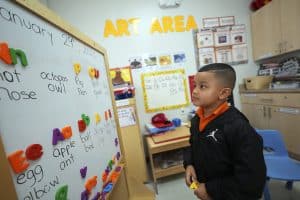Written by Carla R. Chamberlin for Bucks County Women’s Advocacy Coalition
If you have not been in a classroom recently, you might not recognize all of the learning activities and tools, but you would be reassured by the dedication, energy, and expertise of the teachers. Although teaching resources have expanded immeasurably (if not equitably), the social climate of teaching has become more constrained and challenging. We face local and global crises that today’s young people must confront with exceptional knowledge, skills, and passion. Yet many school districts here in Bucks County and around the nation are taking steps to inhibit learning by banning certain subjects and mistrusting the professional integrity of educators.
As of summer 2022, educational gag orders that prevent teachers from talking about “divisive concepts” in classrooms (from K-12 through university level) have become policy in 19 states, and over 70 bills in 28 states propose to ban, for example, topics that might make students feel uncomfortable and the presentation of historical facts that might show the United States in a negative light. In Pennsylvania, the proposed HB 1532 and SB-1278 bills place restrictions on free speech in higher education and K-12, respectively. At local and national levels, school districts have implemented polices that censor materials referring to race, LGBTQ issues, rights and activism, gender identity, or have people of color as lead or prominent characters. Pennsylvania, in fact, ranks second in the nation for the number of books banned in 2021.
These policies affect all
These policies affect all students, all teachers, and all community members. They forbid teachers from engaging students in critical thinking about the world around them. One rationale behind these legislative efforts is the premise of protecting students’ comfort by not allowing any debate or controversy to surface in the classroom. Another justification is to protect students from information about diverse identities. Students will be exposed to diversity anyway (both online and off); these policies just ensure that students won’t be able to talk about anything in a safe space with adult guidance. These limitations prohibit discussion of important content and diminish opportunities to develop skills of inquiry, research, evaluation, debate, and intercultural communication. These pieces of legislation assume that our young people are incapable of thinking for themselves and that educators hold a secret power to indoctrinate or “groom” them. Teachers’ roles are to facilitate students’ engagement with and questioning of the information they will encounter both in and beyond the classroom. Students need more opportunities to engage productively with controversial issues, not fewer. Knowledge, skills, and passion should not be replaced by misinformation and disengagement. This version of education mirrors social media, not reality.
READ: Right-Wing Politics And Moral Panic Driving Policy Targeting Central Bucks School District Libraries
In our media-saturated worlds, we are bombarded by information that is decontextualized and simplified in order to attract attention and tap into deep emotional responses. Producers of click-bait and propaganda are not trying to encourage inquiry and reflection. They want impulsive, pre-programmed reactions, whether it be for entertainment, selling products, or selling ideologies. Classrooms, on the other hand, need to reflect the complexities, diversity, and nuances of reality. They should be the places where information is analyzed, interrogated, evaluated and contextualized. Classrooms can show our young people how to talk and listen to each other and develop positive social and leadership skills. What’s happening in our school districts concerns all of us because, right now, our schools are producing our fellow citizens of tomorrow. Our communities cannot flourish if future citizens are not prepared to have productive conversations about issues that affect everyone.
What You Can Do
Join us on Wednesday, September 7, from 1:30-2:15 p.m. on Zoom for the BCWAC series, Keeping It Brief. Our guest will be Dr. Carla Chamberlin discussing the importance of high-quality public education systems for all members of a community.
Visit the PEN America website (pen.org) for more information and updates on legislation about education across the country.
Visit your school district’s website to learn more about your school board members, proposals, and actions. What happens in our local school boards and state legislatures impacts all of us.
Carla R. Chamberlin, Ph.D., The Pennsylvania State University, Abington College and individual partner of the Coalition






